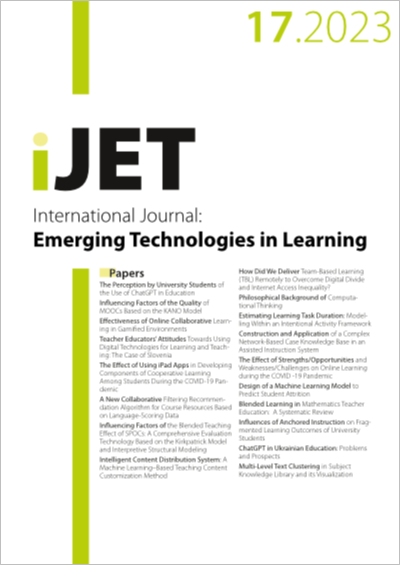Influences of Anchored Instruction on Fragmented Learning Outcomes of University Students
DOI:
https://doi.org/10.3991/ijet.v18i17.41355Keywords:
Anchored instruction, Fragmented learning, Learning outcomes, Questionnaire technology, Analysis of varianceAbstract
With the rapid development of information technology (IT), the traditional knowledge media can no longer meet the needs of students to acquire knowledge and instant messages quickly in the information era. Various online learning platforms have been developed accordingly to provide continuous access to fragmented knowledge and information. IT has been extensively applied in the field of education, offering extensive development spaces and technological supports to establish an “anchored” teaching mode based on the constructivism theory. This has made fragmented learning outcomes, which extensively use IT technology, a salient topic in anchored instruction. The present study draws data from 252 Traffic Engineering students to analyze the influence of anchored instruction on the fragmented learning outcomes of university students. The results indicate the good reliability and validity of the questionnaire, with the five aspects of anchored instruction—context setup, problem identification, independent study, cooperative learning and effectiveness evaluation—all capable of significantly improve the fragmented learning outcomes of university students. Different course types, such as practice courses and theory courses, yield different learning outcomes. The research conclusions provide important references to construct a knowledge network of fragmented knowledge based on anchored instruction, facilitate students to extend existing research contents in fragmented deep learning, and discuss the convenient information environment for anchored instruction based on information technology.
Downloads
Published
How to Cite
Issue
Section
License
Copyright (c) 2023 Wenfang Li, Dan Wang, Yali Cao

This work is licensed under a Creative Commons Attribution 4.0 International License.



